
Former Chief Justice Beverley McLachlin’s life beyond the Court
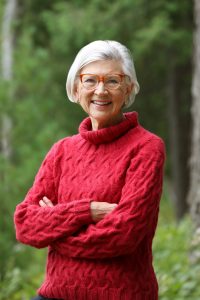 “All I knew was that I wanted to do something that wasn’t ordinary.”
“All I knew was that I wanted to do something that wasn’t ordinary.”
This is how Beverley McLachlin begins her memoir Truth Be Told. From the beginning, she understood that “for a small girl growing up in a remote prairie town in the 1940s,the ordinary was very ordinary indeed.”
She did not know then that she was destined to reach her goal in a spectacular way. But her groundbreaking journey was to take her from her self described very ordinary start in life on a farm in Pincher Creek, Alberta, through an extraordinary career punctuated with firsts, particularly as the first woman and the longest-serving Chief Justice of the Supreme Court of Canada, until her retirement in December 2017.
“Whatever may come after, my time at the Supreme Court of Canada will always be the centrepiece of my life,” she says.
There seems to have been no doubt that there would be a full life beyond the Supreme Court of Canada. As she points out in her memoir, “to retire is a transitive verb. One does not simply retire; one retires from something to something else.”
The “something else” for her is a new career as a novelist, with her first novel, Full Disclosure, published in 2018. (She actually began writing it some 30 years earlier, but her career as a jurist overwhelmed any time for writing fiction.) Full Disclosure quickly became a bestseller and was shortlisted for the prestigious Arthur Ellis Award for crime and mystery writing. Two years
later, she was awarded the Shaughnessy Cohen Prize for Political Writing for Truth Be Told, which was published in 2019. Now, her second novel, Denial, promoted by publisher Simon & Schuster as the next in the series led by Full Disclosure, has just been published.
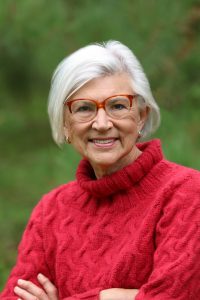 The question of whether a third “Jilly Truitt” novel— the name of the lawyer protagonist in Full Disclosure and Denial—is in the works remains open.
The question of whether a third “Jilly Truitt” novel— the name of the lawyer protagonist in Full Disclosure and Denial—is in the works remains open.
“I’m thinking about it, but I haven’t started writing yet,” says Beverley. “One of the things that I particularly like about writing fiction is that I can explore a problem without judging. Readers can make up their own minds as the characters present perspectives. They have to be multi-layered, as people are, and there are surprises in the characters and, therefore, in the story. The characters
take over in many ways.”
Noting that she tends to write in spurts now as time permits, rather than allotting an early-morning slot before heading to the courthouse, she says, “I’m very busy in retirement and do many other things besides writing. I’m sitting on various not-for-profit boards and committees, some national, some international. Some are concerned with where the world’s going post-COVID. Some, like the Canadian Commission on Democratic Expression, are concerned with where Canada’s going. These are things I couldn’t do when I was a judge. Now, I’m trying to give back a little.”
She is also busy with family matters, as the wife of retired lawyer Frank McArdle, as the mother of her composer/musician son, Angus McLachlin, as a sister, a grandmother and great-grandmother and as the owner of a handsome black Labrador named Darcy.
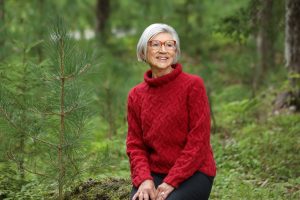 As she said in her retirement speech, when she left her position at the Supreme Court a few months before the mandatory retirement age of 75,“People are living longer; retirement is no longer
As she said in her retirement speech, when she left her position at the Supreme Court a few months before the mandatory retirement age of 75,“People are living longer; retirement is no longer
simply a slide into oblivion. Making choices about what to do tomorrow, much less how to shape the next chapter of one’s life, can be daunting. But you have time, with a bit of luck, to seek another world.”
For Beverley, part of that new world includes remaining connected to the old one. “I loved being a judge, ”she says.“ The main part of my life was as a judge. To suddenly give that up was difficult. When you do these things for 40 years, you acquire certain skills in judgement. I loved getting into the facts of a new case and finding out where it was going to take you to the right answer. This, for me, was fascinating and enjoyable work, and I wanted to continue with it after retirement.”
This is why she was pleased to accept the appointment for a three-year term as a non-permanent judge on the Hong Kong Court of Final Appeal in July 2018—the first Canadian jurist appointed to
the position. Just before her term ended, she was appointed for a second three-year term to continue until July 2024.
Beverley, who was the Massey College Visitor from 2016 to 2020, is also involved in arbitration and mediation cases, nationally and internationally as well as working with not-for-profit organizations that “are doing good in the world.”
As a jurist, her Court’s method of doing good was through such judgements as those on the right to assisted dying, same-sex marriage, the decriminalization of prostitution and the reference on
the right to secede.
The last, she says, “was a really important piece of work and a huge challenge. The Court as a whole brought in that judgement. How were we to answer that question in an honest and legally
appropriate way without making the political situation worse?”
The question followed the 1995 independence referendum in Quebec. Because of the closeness of the vote, the matter was referred to the Supreme Court of Canada. Three years later (on August 20, 1998), the Court decided unanimously that a unilateral declaration of independence would violate both Canadian constitutional law and, international law.
“I also really enjoyed working on equality issues,” says Beverley, who was awarded the French Legion of Honour in 2008 in recognition of her work in the areas of equality and liberty. “Equality, giving everybody a chance, has always been so important to me and at the centre of my concern. For many people getting a fair shake is what justice is about at the end of the day.”
This, according to Jody Raybould-Wilson, then Minister of Justice, was a mark of Beverley’s success as a jurist. “She has been a tireless champion of Canadians’ right to a fair, accessible and efficient system of justice that responds to their needs and aspirations.”
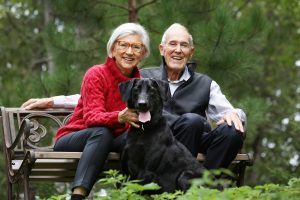 In the eyes of Brian Mulroney, who, as Prime Minister, appointed her as Chief Justice of the Supreme Court of British Columbia in 1988 and to the Supreme Court of Canada the next year, her greatest achievement through her years as a jurist “probably wasn’t a particular case. Rather, it was that she provided such strong leadership, in a collegial and widely admired fashion across Canada.”
In the eyes of Brian Mulroney, who, as Prime Minister, appointed her as Chief Justice of the Supreme Court of British Columbia in 1988 and to the Supreme Court of Canada the next year, her greatest achievement through her years as a jurist “probably wasn’t a particular case. Rather, it was that she provided such strong leadership, in a collegial and widely admired fashion across Canada.”
The admiration is reflected in the many honours she has collected through the years, including being a Companion of the Order of Canada since 2018, a Companion of the Venerable Order of
Saint John since 2006 and the recipient of some 31 honorary degrees from academic institutions across the country.
Although noted for encouraging consensus among members of the bench, she also dissented on a number of occasions. For example, she was the only dissenting judge in the Sue Rodriguez case of 1993,arguing that the prohibition of assisted suicide was unconstitutional. (Sue Rodriguez, who had amyotrophic lateral sclerosis [ALS],sought the right to die with dignity 23 years before medical assistance in dying [MAID] became legal in Canada.)
“I feel that the judge’s job is to answer the question that has been put before the Court in the right way, having regard to the law and the evidence,” says Beverley. “We are not legislators and can’t be swayed. We try to follow where the law and the evidence take us. Of course, your perspectives and inclinations shape you, but I’ve always tried to be apolitical, and I’m very proud of the fact that
I don’t think I can be labelled.”
The label that might have been applied early in her career as a judge was a comment on the speed of her meteoric rise through the court system. After completing undergraduate and graduate degrees in Philosophy at the University of Alberta, she “gave the law a try” at the suggestion of her then-fiancé Rory McLachlin. (She completed her law degree as the gold medalist in her class in the same year that she completed her second Philosophy degree.)
“He probably knew me better than I knew myself because I loved it, and the rest of my life has been in the law one way or another, ”she says.“ He also said that I would be on the Supreme Court of Canada someday. I used to laugh. I thought it was a fantasy, but he turned out to be right.”
After being called to the bar in Alberta in 1969 and in British Columbia two years later, she practised and taught law in B.C. until she became a judge in 1981,first at County Court in Vancouver, then five months after that as a member of the Supreme Court of British Columbia. Three years later, she was appointed to the province’s Court of Appeal and was made that Court’s chief justice shortly afterwards. Then, in 1989, she was appointed to the Supreme Court of Canada.
As Paul Beckmann, the treasurer of the Law Society of British Columbia, said at the time, “The new justice is noted for two things. First, it is evident looking at her career that she couldn’t keep a job. Second, she has made it through the court system faster than most cases.”
When then Prime Minister Jean Chrétien elevated her to become Chief Justice in 2000,she demonstrated that she could indeed keep a job and completed her career as the longest-serving Chief Justice of the Supreme Court of Canada.
As current Prime Minister Justin Trudeau said of her, “She is one of Canada’s very finest jurists…her contributions reach into every part of our law. Canadians owe her an immense debt.”
And, with reference to one of her favourite poems Ulysses by Alfred Lord Tennyson: Some work of noble note, may yet be done.
“My basic plan at this point in my life is just to enjoy each day to the full,” she says. “And to keep doing the many things that I’m doing as long as I have the energy to do them. I love the fact that I’ve done a lot of different things in my life. We should do many different things, provided they bring us satisfaction. As long as you keep your mind and imagination going, you can
take on new challenges.”
So, her journey continues.
Venerable Order of Saint John
The Venerable Order of Saint John is a British royal order of chivalry constituted by royal charter from Queen Victoria in 1888 and dedicated to John the Baptist.
It became associated with the founding in 1882 of the St.John Ophthalmic Hospital near Jerusalem and the St. John Ambulance Brigade in 1887.
The Order has a worldwide mission “to prevent and relieve sickness and injury, and to act to enhance the health and well-being of people anywhere in the world.”
Massey College Visitor
Massey College was established in 1960 and is associated with the University of Toronto.
Massey College Visitors are recognized community leaders who exemplify the core values of the College, act as advisors to the Principal and Governing Board and ambassadors for the College’s work.
The Visitor was originally established as the “person to whom application could be made by Corporation in cases of deadlock, or notable disagreement…that cannot be resolved by ordinary procedures.”
The Canadian Commission on Democratic Expression
The Canadian Commission on Democratic Expression was formed to study and provide informed advice on how to reduce harmful speech on the Internet without impairing free speech.
Each year for three years, the initiative will bring together a small group of eminent Commissioners to develop recommendations that address the democratic harms of digital technologies.
From 2020 to 2021, the Commission studied and published advice on how to prevent and mitigate the negative effects of illegal and other forms of harmful online content on democracy in Canada while encouraging robust democratic debate and dialogue.
Legion of Honour
The Legion of Honour, officially National Order of the Legion of Honour or Ordre National de la Légion d’honneur is the premier order of the French republic.
It was created by Napoleon Bonaparte on May 19, 1802, as a general military and civil order of merit conferred without regard to birth or religion.
Anyone admitted to the order swears to uphold liberty and equality.
Books by Beverley McLachlin
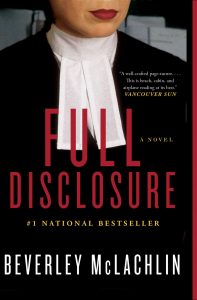 Full Disclosure
Full Disclosure
Simon & Schuster 2019
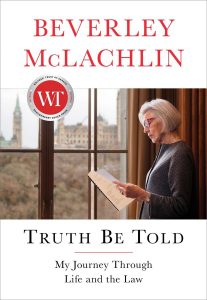
Truth Be Told
Simon & Schuster 2020
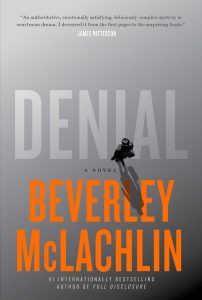 Denial
Denial
Simon & Schuster 2021






